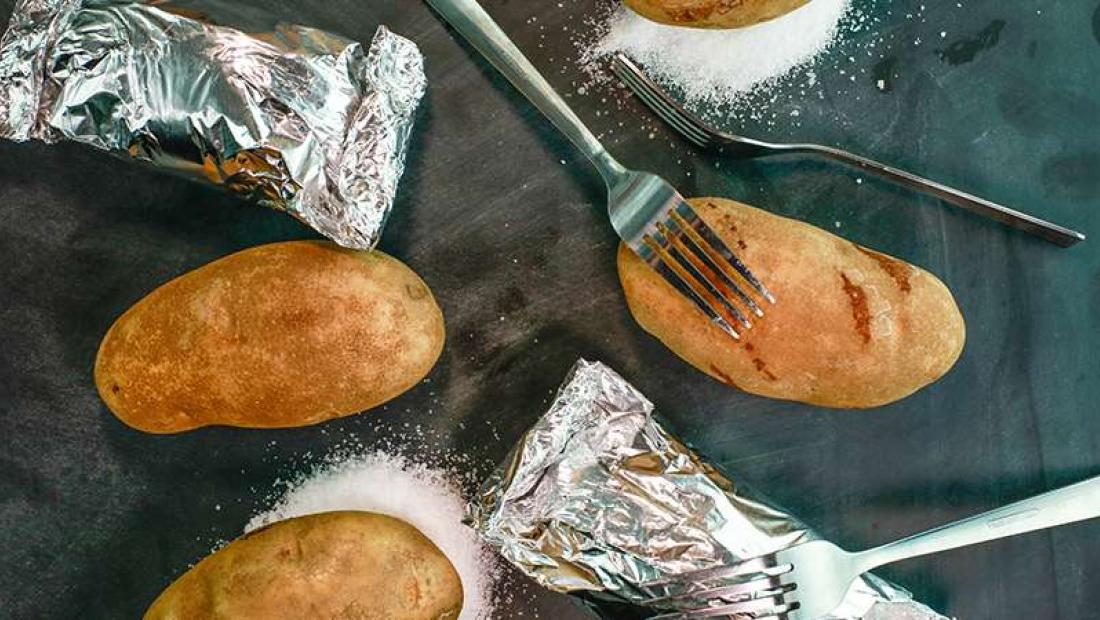
Why on Earth do we poke a potato with a fork before baking it in the oven? Does it really prevent your potato from exploding in the oven? Those were two key questions we asked ourselves and our loyal readers on Facebook the other week.
As it turns out, many of you said you do it because, well, that's just what your mom did.
Since you guys seem to be curious and into this question too, our amazing culinary team decided to conduct a little experiment in our test kitchen. We tested three methods -- the "Zero-Effort Method," the "Pile-of-Salt Method" and the "Wrap-in-Foil Method" -- and compiled their observations for you to see. Check them out, below.
1.) ZERO-EFFORT METHOD
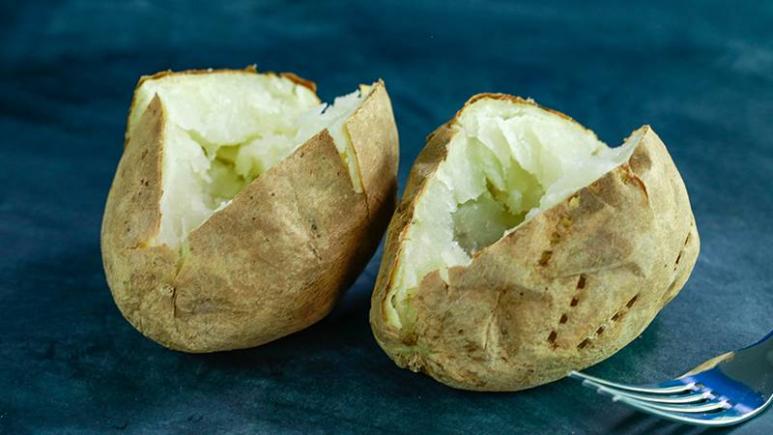
For this experiment, we washed two potatoes and poked holes with a fork in one of them, leaving the other unpoked. The potatoes were then placed in the oven at 400 degrees Fahrenheit, and they each took one hour to fully bake.
Overall, we did not detect any difference between the poked and unpoked potatoes.
In fact, the interior of both potatoes had a light, flaky texture. The skins, meanwhile, also looked the same; no discernable differences in texture were noticed, other than the visual fork marks. There were no potato explosions during this experiment.
2.) PILE-OF-SALT METHOD
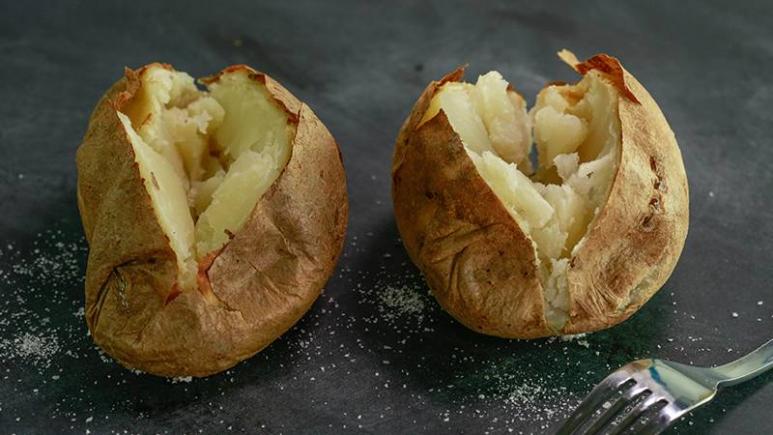
After washing the potatoes, we put a pile of salt onto a tray, placed the poked and unpoked potatoes on top and put them in the oven at 400 degrees Fahrenheit.
Total baking time? One hour – the exact same amount of time as the “Zero-Effort Method.”
Similarly, we did not detect any major differences between the poked and unpoked potato, either inside or out (other than the visual poke holes, of course). In fact, the only minor difference we noticed was that the potatoes in "Pile-of-Salt Method" it tasted a bit more seasoned, slightly lighter and flakier. We believe the salt permeated the potato allowing for more flavor. There were no potato explosions during this experiment.
3.) THE WRAP-IN-FOIL METHOD
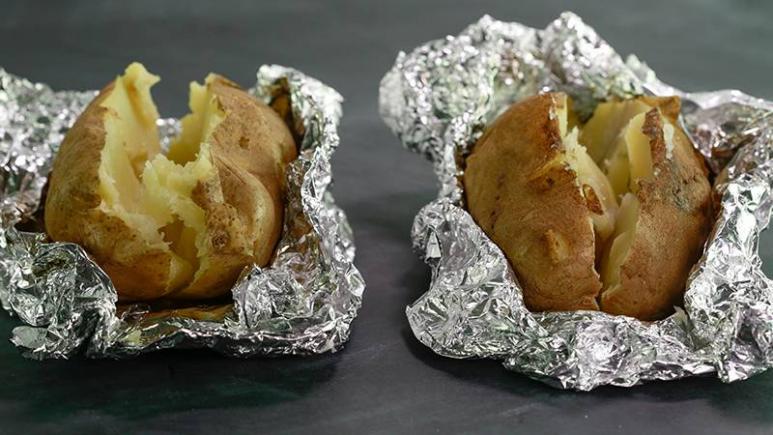
This time, we washed the poked and unpoked potatoes and wrapped them in foil, placing them into the oven at 400 degrees Fahrenheit. The potatoes took one hour and 15 minutes to bake -- 15 minutes longer than the previous two methods.
How did they taste? We did not notice any differences between the two. The skins were also the same; no discernable differences in texture were observed other than, again, the visual marks of the fork.
Compared to the other methods, the foil-wrapped potatoes had a wetter interior. They were also a little bit creamier, while also lighter and less flaky. We also noticed that the skin of the foil-wrapped potatoes were not as crisp as the results from the other test methods. There were no potato explosions during this experiment.
The Exploding Conundrum
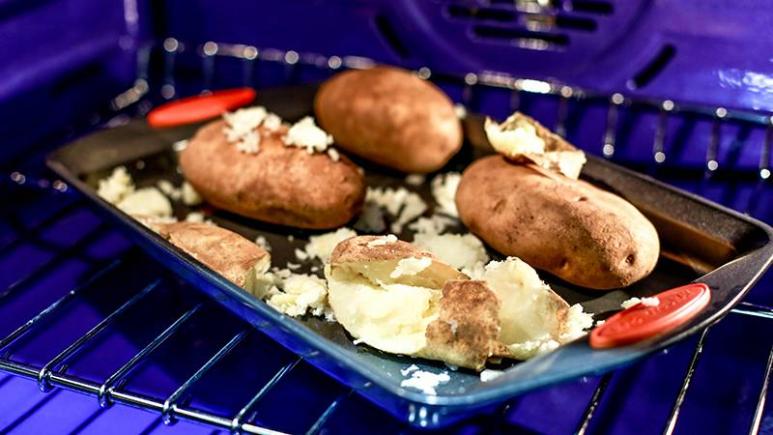
Out of the handful of professional cooks here at the show, not one of us had a potato explode.The above photo is simply a reenactment.
At some point, we started thinking, "Well, it's not like the skin of the potato isn't porous; steam should be able to escape it." So, we just started throwing unpoked potatoes into the oven at 400 degrees Fahrenheit and STILL there were no explosions. Huh.
When we read through all of the thousand some-odd comments on Facebook, we discovered that many of you have had a lot of different experiences. Some Facebook fans had baked hundreds of unpoked potatoes without explosions, while others had them explode. Some have baked poked potatoes and they wound up exploding, anyway (and so on and so forth).
This left us scratching our heads and saying, "What gives?!"
Here is some guess work as to why some of you guys have had potatoes explode.
As the potatoes get older, the starches turn into sugars -- perhaps that increases the chances of explosions. OR, is it that the older potatoes have less water in them so less steam build up there for less explosions? Grr -- we still don’t know.
If either of these explanations are accurate, it still doesn’t explain why some people's potatoes exploded after they poked them. Maybe their poke just wasn't deep enough?
So, what does all this mean? Should you always poke a potato pretty deep, cross your fingers and hope for the best? Unclear. In fact, we’ll probably keep debating this for the rest of Season 9 (and we haven’t even touched Mashed Potatoes … yet). Feel free to pose your theories in the comments, below, to help us solve this Potato Problem. We’d love to hear ‘em. Oh, by the way:
What about the people who never poke a potato and never have an explosion? All we’ll say is, “Lucky them.”
P.S. Our Favorite Facebook Comment:
"I have a friend who had 9 siblings and her parents went out for a Sunday drive. The older girls were told to put a fork in the potato then put them in the oven and that is what they did. Her mother came home to find 11 potatoes in the oven with a fork in each potato."
So, we reenacted it for fun!



